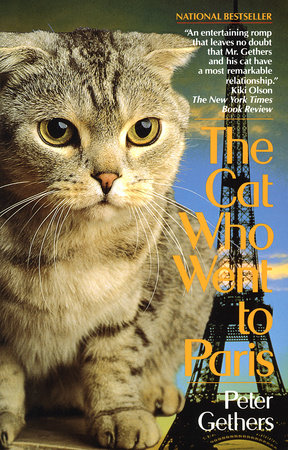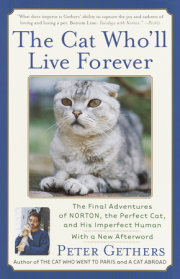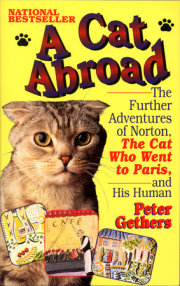Foreword
A few weeks ago, I made out my first-ever will. At thirty-six, it left me feeling slightly melancholy, more than slightly middle-aged, and somewhat sentimental. Looking to share my sentiment, I mentioned to my mother that I had—quite magnanimously, I thought—left my New York City apartment to my brother Eric’s one-year-old son, Morgan. Instead of the expected motherly glow of affection and pride, she looked at me as if I were an insane person.
“Can you do that?!” she asked.
I didn’t understand her wide-eyed confusion, especially since, on the scale of human accomplishment, my mother ranks her small grandchild somewhere between Mahatma Gandhi, Thomas Jefferson, and Bo Jackson.
“Why not?” I said, just a tad confused. “I mean, I hope he doesn’t get to use it for another forty or fifty years, but if he does, it’ll go to Eric first and he can—”
“Did you say Morgan?” she interrupted.
“Yeah. Who else?”
“I thought you said Norton,” dear old Mom told me.
“My cat? You thought I left my apartment to my cat?”
“Well,” she said, in a particularly wise moment, and shrugged, “with Norton, you never know.”
1
Before the cat who went to Paris
This is a book about an extraordinary cat. However, the extraordinary thing about any cat is the effect it has on its owner. Owning a cat, especially from kittenhood, is a lot like having a child. You feed him, do your best to educate him, talk to him as if he understands you—and, in exchange, you want him to love you. He can drive you mad with his independence. He can, just as surely as a child, create a tremendous desire to protect him from anything bad. He is small, vulnerable, wonderful to hold—when he lets you. And he throws up on just about the same regular schedule.
Like children, cats exist on a separate and probably higher plane than we do, and like children, they must be at least partially defined by their relationship with their parents. And though they can do all sorts of amazing things such as hiding in the tiniest room imaginable and refusing to be found no matter how late you are for wherever it is you have to take them, they cannot write their autobiographies. That is left to humans. So this, as it must be, is also a book about people. And thus about relationships. And all sorts of other things cats have no business being involved with but can’t seem to help themselves.
My involvement with a cat was strictly accidental. In fact, I had to be dragged into it kicking and screaming.
By way of example, a little over seven years ago, someone asked me to name ten things that I believed were truly self-revealing, deeply heartfelt, and absolutely irrevocable. This person, a woman I was going out with, asked me to do this, I believe, because she thought I was a person without much emotion, without a lot of passion. She had, I also believe, been through way too many years of Upper East Side New York therapy in which she had made way too many lists like this. The fact of the matter was that I had plenty of emotion and plenty of passion. I just didn’t have much for her. People often seem to fall into this trap in their relationships. They seem to feel that if someone doesn’t do what he is expected to do, then there must be something wrong with him. This is a much easier way of getting through life, I suppose, than having to think there might be something wrong with the expectations or oneself or the world. Or life.
I did, finally and over my better instincts, make a list of ten things I believed were true about myself. This is another trap that people fall into in their relationships (which cats never fall into): we do a lot of stupid things just so we don’t have to be alone.
Anyway, this is the list that appeared:
1. I will never vote Republican.
2. Love does not usually hold up to close inspection
3. … except for baseball. I love baseball—watching it, listening to it on the radio, talking about it, reading box scores. I am a baseball junkie.
4. Life is basically a sad thing, with an even sadder ending, so anything that brightens up a moment along the way is okay. Especially if it’s funny.
5. I don’t like being a part of anything—a religion, a regular softball game, a corporation, a government, you name it. As soon as someone becomes something, I tend to think he or she is lost.
6. Friendship must be earned. It is too important to fritter away on someone who doesn’t want it, won’t reciprocate it, or isn’t worthy of it. As near as I can tell, people don’t have all that much inherent value, but friends sure do.
7. There’s very little cause for cruelty.
8. On the other hand, I’ll pick entertaining and intelligent over nice any day of the week.
9. I don’t care what anyone says: I think Meryl Streep’s a lousy actress.
10. I hate cats.
In the years that have passed, a few of these irrevocable items have actually remained steadfast. Several have been altered somewhat, some bordering on the brink of unrecognizability. And there is one of the above that is so ludicrous it now seems inconceivable that it ever crossed my mind, much less made it through my mouth or found its way onto paper.
Numbers 1, 3, 6, and 7 remain absolutely unchanged.
Number 4 is basically sound, although I cannot be nearly so definite about the word “anything.” There are terrifying things I did not conceive of when I made my initial list: oat bran, crack, People magazine cover stories on recovering alcoholic celebrities, wilding, sequels, and Abe Rosenthal’s “On My Mind” column in the New York Times.
Numbers 8 and 9 are a little tricky. 8 now depends more and more on my mood and how hard my day was. And Meryl Streep’s Australian accent really is astonishing.
Number 5 has changed somewhat. I have found something I am willing to join.
Number 2 clearly relates to Number 5, which will become much clearer as this book continues, and they both, amazingly enough, have changed because of Number 10.
Ah yes, Number 10 …
Well, now we’ve come to the youthful folly, a statement made in such ignorance it boggles the mind …
I, of course, have a cat now. Norton.
I treat this cat as very few animals—or people, for that matter—have ever been treated.
If he is asleep in the middle of the bed when it’s time for my day to end, I sleep curled up in a corner of the mattress, happily braving stiff necks and bad backs so he remains undisturbed.
I take Norton everywhere I go. He’s been skiing in Vermont, to a writers conference in San Diego, to the best restaurant in Amsterdam, back and forth on a regular basis to Paris. At one of that city’s premier hotels, the Tremoille, when my assistant calls to make a reservation for Mr. Gethers, the desk clerk knows to ask: “Avec son chat?”
I bought a house in Sag Harbor, a real-life Bedford Falls of a town near the tip of Long Island, and though there were many other mitigating circumstances, the secret and overriding reason for the purchase was because my cat loves to run around in a yard.
I’ve had one girlfriend break up with me because she believed I liked Norton better than I liked her (which I did). And I once didn’t go on a vacation with another girlfriend to my favorite resort hotel in America because they wouldn’t accept small, very well-behaved felines.
I worry about him, I talk about him (and to him, I have to add) to the point of idiocy, and if he doesn’t sleep within a crooked arm’s reach of my pillow—which he doesn’t about one day a week—then I don’t sleep very well. I actually worry that I’ve done something to offend him.
I sometimes—and this is a particularly tough one to admit publicly—let him eat off my spoon. Usually ice cream or yogurt. Chocolate’s his favorite flavor, and it’s a pretty funny thing to watch when he decides it’s time to lick that sucker clean.
It is hardly a one-way street, however. He does all sorts of things for me that are pretty wonderful for a cat.
He goes for walks with me. No leash. On a beach with no cars around to disturb him, he’s gone up to two miles, walking anywhere and everywhere from ten feet behind me to three feet in front of me. His record in traffic is three blocks, which he does most Sunday mornings when I stroll to Sean’s Murray Hill market in Sag Harbor.
Norton will wait for me anywhere, no matter where I leave him. If I’m at a hotel, I can dump him outside by the pool or in the garden, and let him play there all day or night long. When I go to get him, he will be nowhere in sight, but when I call or whistle for him, he’ll meow exactly once, then leap out of his hiding place to rush to join me. I honestly believe I could drop him in the heart of an African jungle, leave him for a year, reappear, and as long as I could find the bush he was last seen scurrying under, he’d be there waiting for me.
He likes to roughhouse. His favorite game is to pounce on my hand when it’s moving tauntingly under a sheet, wrestle it, and try to eat it—but he will never bite or scratch any part of me that he recognizes as mine. If sometimes he gets carried away in the heat of battle and a claw accidentally isn’t pulled in in time when my hand comes out from the linen, he will freeze at the sound of my yelp, put his paws over his eyes, and bury his nose under the pillow in shame until I pat him on the head and assure him I’m okay.
He sits on the side of the tub when I take a bath.
If I, as I sometimes forgetfully do, close the door to a room, leaving Norton on the other side, he will howl and meow as if possessed until I open the door. He does not like to be left outside of anything I am inside.
He trusts me.
He is quite a comfort when I’m sad and makes being happy much more fun.
He has seen me through broken hearts and illness and death.
I love my cat, if you haven’t gotten the drift yet.
He actually forced me to change my list of irrevocable self-realizations.
In doing so, he changed my life.
When a small gray animal does a little thing like that for you, how can you not let him sleep in the middle of the bed when he’s tired?
Copyright © 2013 by Peter Gethers. All rights reserved. No part of this excerpt may be reproduced or reprinted without permission in writing from the publisher.







